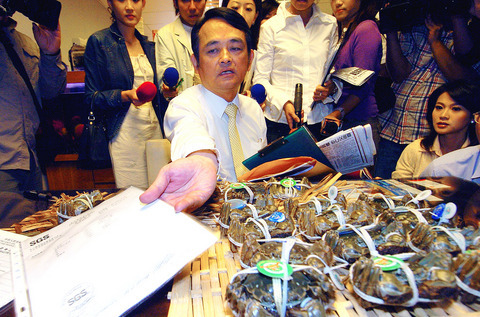Travelers arriving in Taiwan will not be allowed to bring hairy crabs into the country anymore after traces of carcinogens were detected in crabs imported from China, the Department of Health (DOH) announced yesterday.
As of yesterday, hairy crabs imported from China, also known as dazha crabs, will require a food safety inspection certificate, the DOH said.
After the Bureau of Standards, Metrology and Inspection on Monday found traces of carcinogens in a consignment of hairy crabs, six new batches of the crabs containing cancer-causing substances were discovered yesterday, the DOH officials said.

PHOTO: CHANG CHIA-MING, TAIPEI TIMES
The officials estimated that more than 3 tonnes of carcinogen-tainted hairy crabs from China have been consumed in Taiwan.
According to the DOH's inspection data, the nitrofuran concentration in the six new batches of hairy crabs from the Shanghai area averaged between 1.1 parts per billion (ppb) and 1.25ppb, while the batch that inspected on Monday had a nitrofuran content of 4.7ppb.
Nitrofurans are a group of cancer-causing chemicals which have been banned for use in food-producing animals in most countries.
Lawmakers yesterday accused the DOH of concealing information that batches of hairy crabs imported from China since last year were found to contain carcinogens.
The information was first disclosed at a press conference held by Democratic Progressive Party legislators Cheng Kuo-chung (
"The DOH didn't make the information public until we demanded in an official document late yesterday that it should do so immediately," Cheng said.
The lawmakers said that DOH officials had to take responsibility for concealing the findings.
Displaying three hairy crabs that had been bought at a supermarket, the lawmakers said that there were no indications to consumers about where the crustaceans were from and whether they had been certified safe for consumption.
The lawmakers urged the DOH to eliminate loopholes in inspecting foods from China.
"We suggest that the government should station inspectors in China to ensure food hygiene before the products are transported into the country," Wu said.
"Meanwhile, the government should demand that Chinese hairy crabs be sold only with a quarantine certificate attached," Wu added.
Hsia Tung-ming (蕭東銘), the director of the DOH's Bureau of Food Safety, said that tougher measures would be implemented to prevent more contaminated crabs from reaching consumers.
Testing will be stepped up and all shipments of crabs reaching Taiwan will need an examination report proving that the crabs do not contain residual antibiotics exceeding the legal limits.
Meanwhile, the president of a company that imports hairy crabs from China said at a news conference yesterday that all the crabs that have been listed as "problematic" were distributed by the Taipei Farm Produce Marketing Co and that officials from the Taipei City Department of Health had inspected the shipment and determined that the amount of carcinogens they contained was negligible.

Conflict with Taiwan could leave China with “massive economic disruption, catastrophic military losses, significant social unrest, and devastating sanctions,” a US think tank said in a report released on Monday. The German Marshall Fund released a report titled If China Attacks Taiwan: The Consequences for China of “Minor Conflict” and “Major War” Scenarios. The report details the “massive” economic, military, social and international costs to China in the event of a minor conflict or major war with Taiwan, estimating that the Chinese People’s Liberation Army (PLA) could sustain losses of more than half of its active-duty ground forces, including 100,000 troops. Understanding Chinese

The Ministry of Foreign Affairs (MOFA) yesterday said it is closely monitoring developments in Venezuela, and would continue to cooperate with democratic allies and work together for regional and global security, stability, and prosperity. The remarks came after the US on Saturday launched a series of airstrikes in Venezuela and kidnapped Venezuelan President Nicolas Maduro, who was later flown to New York along with his wife. The pair face US charges related to drug trafficking and alleged cooperation with gangs designated as terrorist organizations. Maduro has denied the allegations. The ministry said that it is closely monitoring the political and economic situation

UNRELENTING: China attempted cyberattacks on Taiwan’s critical infrastructure 2.63 million times per day last year, up from 1.23 million in 2023, the NSB said China’s cyberarmy has long engaged in cyberattacks against Taiwan’s critical infrastructure, employing diverse and evolving tactics, the National Security Bureau (NSB) said yesterday, adding that cyberattacks on critical energy infrastructure last year increased 10-fold compared with the previous year. The NSB yesterday released a report titled Analysis on China’s Cyber Threats to Taiwan’s Critical Infrastructure in 2025, outlining the number of cyberattacks, major tactics and hacker groups. Taiwan’s national intelligence community identified a large number of cybersecurity incidents last year, the bureau said in a statement. China’s cyberarmy last year launched an average of 2.63 million intrusion attempts per day targeting Taiwan’s critical

AGING: As of last month, people aged 65 or older accounted for 20.06 percent of the total population and the number of couples who got married fell by 18,685 from 2024 Taiwan has surpassed South Korea as the country least willing to have children, with an annual crude birthrate of 4.62 per 1,000 people, Ministry of the Interior data showed yesterday. The nation was previously ranked the second-lowest country in terms of total fertility rate, or the average number of children a woman has in her lifetime. However, South Korea’s fertility rate began to recover from 2023, with total fertility rate rising from 0.72 and estimated to reach 0.82 to 0.85 by last year, and the crude birthrate projected at 6.7 per 1,000 people. Japan’s crude birthrate was projected to fall below six,